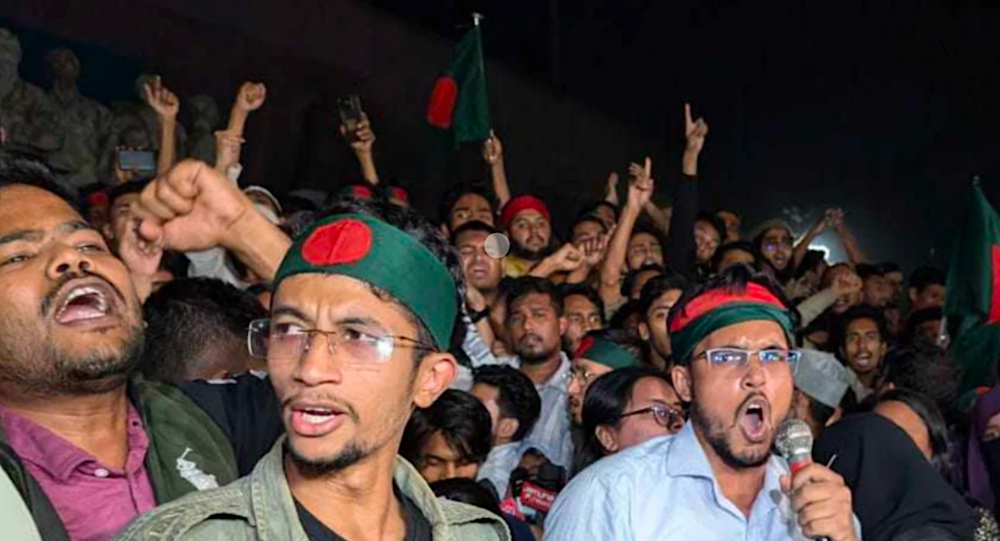Assault on consulate in India sparks protests and tensions between Dhaka and Dehli
Hundreds of students have taken to the streets in recent hours to demonstrate against the attack on the diplomatic representation, with serious damage to the building. Earlier there had been demonstrations in India against the arrest of Hindu leader Chinmoy Krishna Das in the neighbouring country. The two governments tighten control and security measures.
Dhaka (AsiaNews) - Tensions have risen again between Dhaka and Delhi, in an overall picture of critical and gradually deteriorating relations between the two countries following the fall in Bangladesh of the government led by former prime minister Sheikh Hasina on August 5.
The latest episode to have rekindled tempers was recorded on 2 December in Agartala, in the federal state of Tripura of which it is the capital, in north-east India: dozens of protesters stormed the Bangladeshi consulate, causing serious damage to the building. In response, a few hours later hundreds of students and activists demonstrated in Dhaka against the attack, which the Delhi government distanced itself from, calling it ‘deeply regrettable’.
Commenting on the assault, the Indian Ministry of Foreign Affairs recalled that ‘diplomatic and consular property should not be targeted under any circumstances’. The government, the note continued, is ‘intensifying security’ around Bangladeshi diplomatic facilities and representations in the country, while police forces have arrested at least seven people in connection with the incident in the days since. However, the condemnation and arrests were not enough to try to ease the escalation of tension between the parties.
For Delhi, Bangladesh is not only a neighbouring country, but also a strategic partner and crucial ally for border security, particularly in the north-eastern states, as well as sharing close cultural and linguistic ties.
Hindus make up less than 10% of Bangladesh's 170 million population and, in the past, community leaders have reported cases of hate attacks and discrimination by radical Islamic groups and some political parties. In the aftermath of Hasina's chaotic overthrow in August, many of her supporters were targeted, including religious minority groups traditionally seen as supporters of the former premier.
After weeks of relative calm, the situation became tense again in the aftermath of the arrest by the Dhaka authorities of the Hindu leader, Chinmoy Krishna Das, which again inflamed tempers between the parties.
A crescendo of violence led hundreds of protesters affiliated with the Hindu Sangharsh Samiti to storm the diplomatic headquarters on 2 December and tear down the Bangladeshi flag, then set it on fire.
The unrest spread to other areas along the border, where protesters blocked trade, disrupting imports and exports, and set fire to goods from their neighbour. In response, the Dhaka government lodged a formal protest against the attack, while demonstrations against the assault multiplied on campuses.
To prevent further violence, the governments of the respective countries decided to strengthen controls and security devices around diplomatic missions. In Bangladesh, police and army units were deployed outside the Indian consulate in Khulna following reports of planned protests.
Indignation and anger over the attack on Agartala is mounting among citizens, and appeals and calls for street demonstrations are multiplying on social media. Law expert Asif Nazrul describes the attack by members of the Hindu SangharshSamiti as ‘atrocious’ and wonders what harsh response Delhi would have adopted if a radical Muslim movement had attacked an Indian diplomatic representation in the territory.
West Bengal Chief Minister Mamata Banerjee fuelled the controversy by urging the Indian central government to request the deployment of UN peacekeepers to Bangladesh and calling for Prime Minister Narendra Modi's intervention to protect religious minorities.
Mamata's remarks triggered fierce criticism across the border, with political leaders rejecting the accusations. Among them was Bnp Secretary General Mirza Fakhrul Islam Alamgir, who said that the Indian politician's words were a ‘direct threat’ to Bangladesh's independence and territorial sovereignty.
Finally, demonstrations by university students, students and activists continue with a rally at Dhaka University on 2 December and other pickets called for the coming days.







.png)










